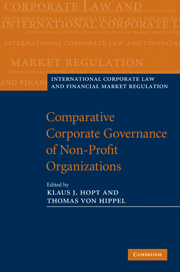Book contents
- Frontmatter
- Contents
- List of contributors
- Preface
- Abbreviations
- PART I Economic findings and theories on nonprofit organizations
- PART II The nonprofit sector: private law, trust law, tax law in selected countries
- 4 Anglo-American countries
- 4.1 Nonprofit organizations in the United States
- 4.2 Harmonising nonprofit law in the European Union: an English perspective and digest
- 5 Germanic countries
- 6 Romanic countries
- 7 Transformation countries
- PART III The board of nonprofit organizations
- PART IV Good governance of nonprofit organizations: activities and regulatory problems
- PART V Good governance of nonprofit organizations: self-regulation, disclosure and supervision
- Index
- References
4.1 - Nonprofit organizations in the United States
from 4 - Anglo-American countries
Published online by Cambridge University Press: 05 August 2011
- Frontmatter
- Contents
- List of contributors
- Preface
- Abbreviations
- PART I Economic findings and theories on nonprofit organizations
- PART II The nonprofit sector: private law, trust law, tax law in selected countries
- 4 Anglo-American countries
- 4.1 Nonprofit organizations in the United States
- 4.2 Harmonising nonprofit law in the European Union: an English perspective and digest
- 5 Germanic countries
- 6 Romanic countries
- 7 Transformation countries
- PART III The board of nonprofit organizations
- PART IV Good governance of nonprofit organizations: activities and regulatory problems
- PART V Good governance of nonprofit organizations: self-regulation, disclosure and supervision
- Index
- References
Summary
Introduction
The vast array of organizations in the United States that share the designation “nonprofit” are said to inhabit a “sector” of American society – commonly referred to as “the nonprofit sector” and also variously labeled as the “third,” “independent,” “charitable,” “voluntary,” “philanthropic,” “civil society,” and “tax-exempt” sector. The operative assumption is that nonprofits play a societal role that is distinct from that of government and the private, for-profit sector, but much of this terminology is misleading or incomplete.
The diversity of the nonprofit sector is reflected in the legal regime that governs it. If the readers of this paper are like most normal people, they prefer a logical rationale for a legal regime and will be sorely disappointed by the American approach. The legal structure seems to lack consistency, reasonableness, or efficiency. There is no single law of charities in the United States. Instead, there are several statutes that apply, depending on the form of organization – trust or corporation; the focus of the regulator-state or federal, and even local; and the purpose of the regulation. The applicable legal rule may depend upon the form of organization or whether the governing statute is state or federal.
This paper will discuss principles of trust and corporate law, private law, and particularly federal tax law as it applies to nonprofit organizations. It also mentions the law relating to fiduciary obligations, and regulation of charitable solicitation. This aerial view is a mere sketch of the landscape.
- Type
- Chapter
- Information
- Comparative Corporate Governance of Non-Profit Organizations , pp. 129 - 169Publisher: Cambridge University PressPrint publication year: 2010
References
- 2
- Cited by



